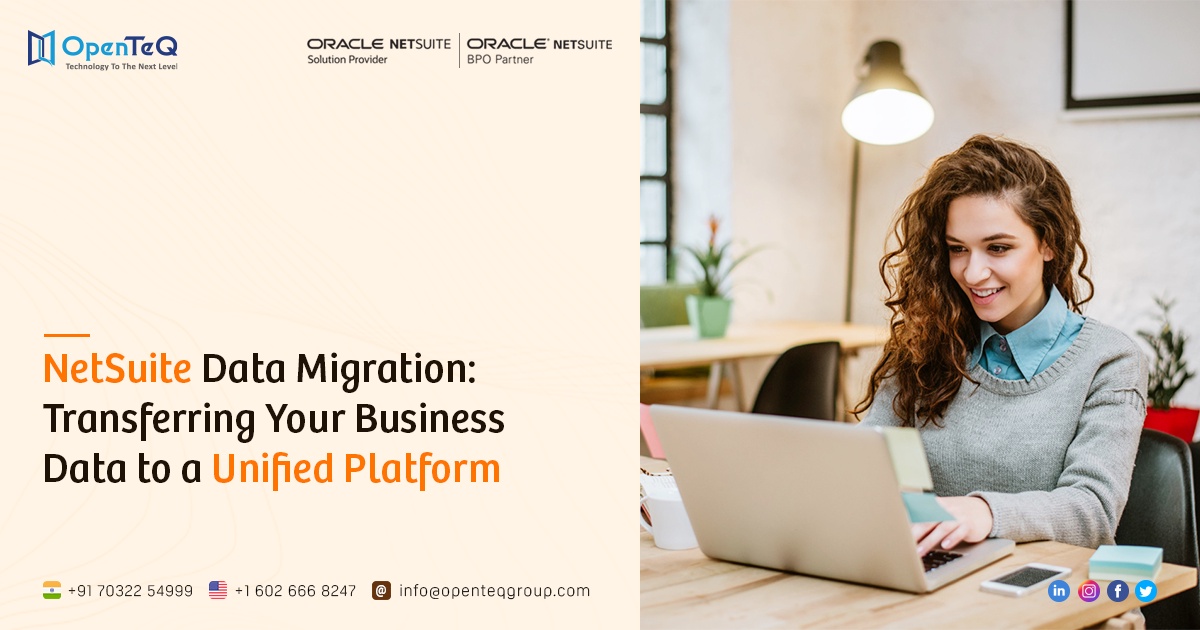NetSuite Data Migration refers to the process of transferring data from legacy systems or other sources into the NetSuite platform. NetSuite is a cloud-based enterprise resource planning (ERP) system that integrates various business functions like accounting, financial management, inventory management, CRM, and e-commerce.
Data migration is a critical step when implementing NetSuite or when transitioning from another system to NetSuite. It involves extracting data from the existing systems, transforming it into a format compatible with NetSuite, and loading it into the NetSuite environment. This process ensures that historical data, transactional records, customer information, product details, and other essential data are accurately transferred and available for use within NetSuite.
Here's how NetSuite Data Migration helps businesses:
- Seamless Transition: NetSuite Data Migration enables businesses to smoothly transition from their existing systems to NetSuite without losing valuable data. This ensures continuity of operations and minimizes disruptions during the migration process.
- Data Accuracy and Integrity: By carefully mapping and transforming data from various sources to fit the structure of NetSuite, data migration ensures that information is accurate and maintains its integrity. This accuracy is crucial for making informed business decisions based on historical data.
- Improved Efficiency: With all data consolidated within NetSuite, businesses can streamline their operations and eliminate the need to switch between multiple systems to access different pieces of information. This improves overall efficiency and productivity.
- Enhanced Reporting and Analysis: NetSuite's robust reporting and analytics capabilities provide businesses with valuable insights into their operations. By migrating historical data into NetSuite, businesses can leverage these reporting tools to analyze trends, identify opportunities, and make data-driven decisions.
- Compliance and Audit Readiness: Many industries have regulatory requirements for data retention and audit trails. NetSuite's data migration ensures that historical records are securely stored and easily accessible, facilitating compliance with regulatory standards and simplifying audit processes.
- Support for Growth and Scalability: As businesses grow, they need scalable systems that can accommodate increasing amounts of data and transactions. NetSuite's cloud-based architecture and data migration capabilities support scalability, allowing businesses to expand their operations without worrying about outgrowing their ERP system.
What data gets migrated?
This could include various types of information depending on your needs, such as:
- Customer data: Names, contact information, purchase history, etc.
- Product data: Descriptions, prices, inventory levels, etc.
- Financial data: Invoices, transactions, accounts payable/receivable, etc.
- Order data: Sales orders, purchase orders, fulfillment details, etc.
- Other business-specific data: Anything relevant to your specific operations.
Why migrate to NetSuite?
There are several reasons why businesses choose to migrate to NetSuite:
- Improved efficiency and automation: Streamline processes and eliminate manual data entry.
- Enhanced visibility and reporting: Gain insights into your business performance with centralized data.
- Scalability and growth: Accommodate future growth without data limitations.
- Modernized technology: Stay ahead with a cloud-based platform.
OpenTeQ is a NetSuite Data Migration consultant that offers various services related to NetSuite, including data migration. Their data migration services likely include:
- Assessment and Planning: OpenTeQ would work with your business to assess your current data landscape and identify the data that needs to be migrated to NetSuite. They would then develop a comprehensive migration plan outlining the steps, timeline, and resources required for a successful migration.
- Data Extraction: This involves extracting data from your existing systems, databases, spreadsheets, or other sources. OpenTeQ would ensure that data is extracted in a format that is compatible with NetSuite.
- Data Transformation and Mapping: Data from different sources often have different formats and structures. OpenTeQ would transform and map this data to match the fields and requirements of NetSuite, ensuring that data integrity is maintained throughout the migration process.
- Data Cleansing and De-duplication: Before migrating data to NetSuite, it's essential to clean and de-duplicate the data to ensure accuracy and avoid cluttering the new system with redundant or irrelevant information. OpenTeQ would perform data cleansing and de-duplication as part of their migration services.
- Data Loading and Validation: Once the data has been transformed and cleaned, OpenTeQ would load it into NetSuite using appropriate import tools or APIs. They would also perform validation checks to ensure that the migrated data is accurate and complete.
- Testing and Validation: Before completing the migration, OpenTeQ would conduct thorough testing to verify that all data has been successfully migrated and is accessible within NetSuite. Any discrepancies or issues would be addressed and resolved during this phase.
- Post-Migration Support: After the migration is complete, OpenTeQ may provide additional support to help your team familiarize themselves with NetSuite and address any post-migration issues or questions that arise.
OpenTeQ's NetSuite data migration services aim to ensure a smooth and successful transition to NetSuite, allowing your business to leverage the full capabilities of the platform while maintaining data integrity and accuracy.
In summary, NetSuite Data Migration plays a crucial role in helping businesses transition to NetSuite smoothly, ensuring data accuracy and integrity, improving efficiency, enabling better reporting and analysis, ensuring compliance, and supporting long-term growth and scalability.


No comments yet